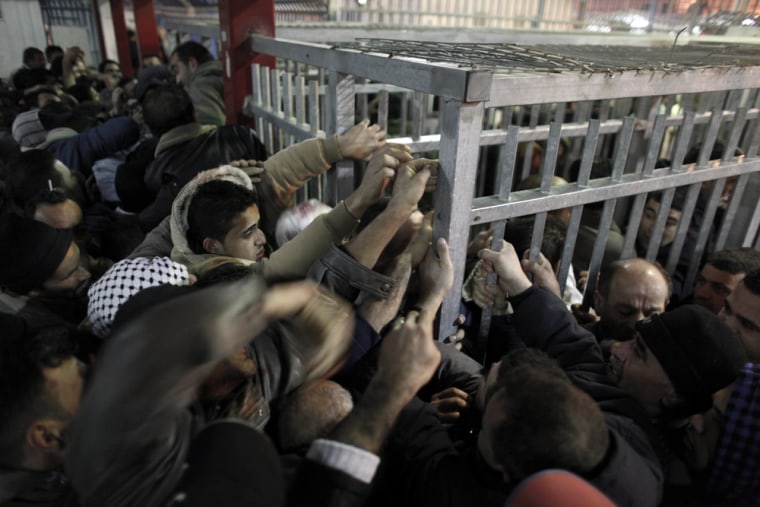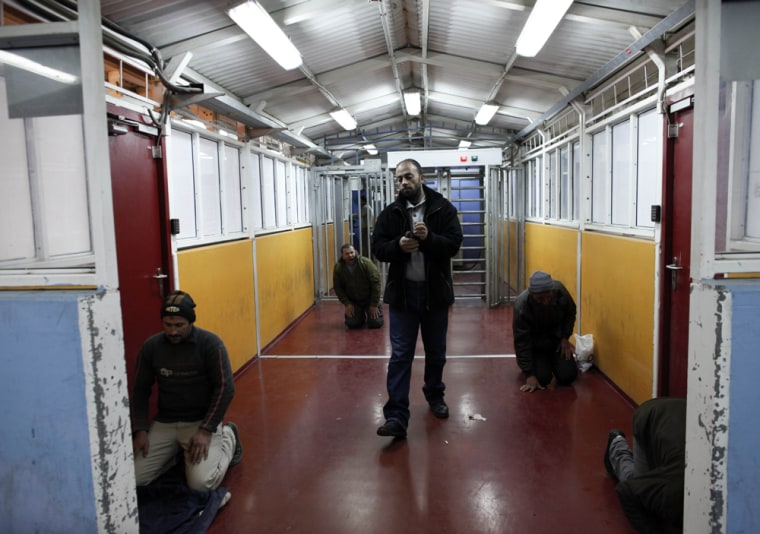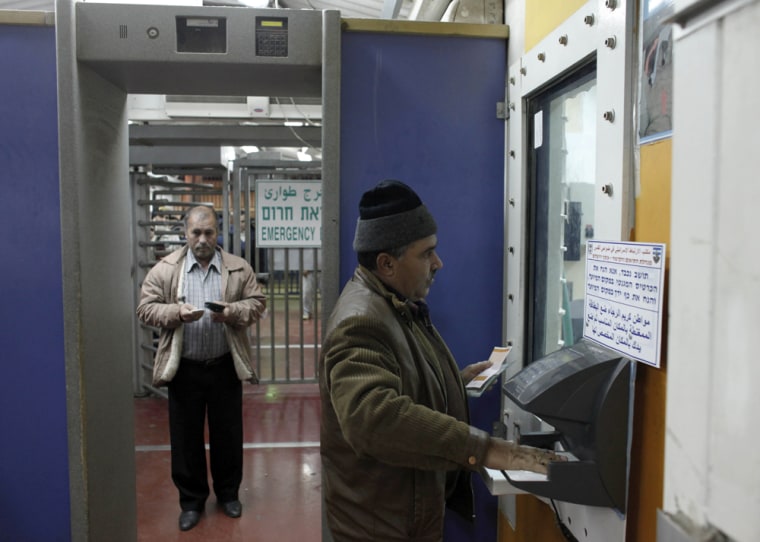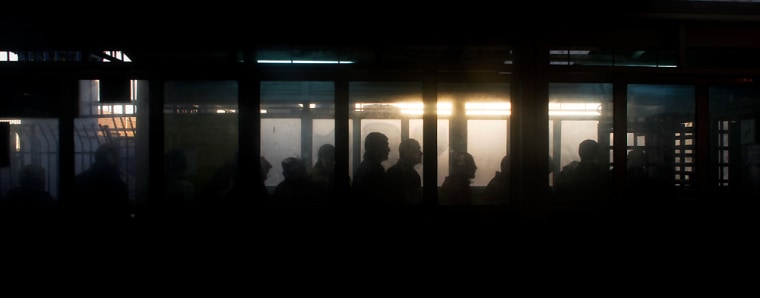The journey to Jerusalem, for tens of thousands of Palestinians, begins in a dank, trash-strewn hangar.
They move through cage-like passages and 7-foot-high turnstiles to be checked by Israeli soldiers from behind bulletproof glass. The soldiers often yell at them through loudspeakers. They are supposed to work in pairs to speed the lines through, but sometimes one of them is asleep, his feet on his desk.
The Qalandia crossing, say the Israelis, is where potential attackers are filtered out before they can reach Jerusalem on the other side. Palestinians say it's a daily humiliation they must endure to reach jobs, family, medical appointments and schools.
This main checkpoint between the northern West Bank and Jerusalem is one of the rawest points of friction between Israel and the Palestinians, a symbol of the day-to-day bitterness that grinds between the two sides as the U.S. struggles to relaunch peace negotiations.
Since taking office last year, Israeli Prime Minister Benjamin Netanyahu has eased Palestinian movement inside the West Bank, but not into Jerusalem. In recent weeks, he has repeated his vow that Jerusalem will never be divided, angering Palestinians who want the city's eastern sector, captured by Israel in the 1967 war, as their future capital.
The separation barrier between Israel and the West Bank slices through several of Jerusalem's Arab neighborhoods, making Qalandia the only way for 60,000 taxpaying residents to reach their city. They too must line up along with tens of thousands of West Bank residents to enter Israel for work — provided they are patient, have permits, and don't arouse suspicion.
For five days, an Associated Press reporter waited with them.
Sunday: Men stand inches apart
Hands plunged deep in his pockets to fend off the pre-dawn chill, Ziad Abu Jalil, 36, enters the hangar and joins one of several long lines. He is headed to his $35-a-day job at a Jewish butchery, yanking chickens from cages to be slaughtered according to kosher rules.
Until a decade ago, his commute from his West Bank village 20 kilometers (12 miles) north would have taken less than hour. But after the Palestinian uprising broke out in 2000, border checkpoints started going up. The Qalandia crossing grew steadily more arduous, and now Abu Jalil has to get up at 4:30 a.m.

Outside of rush hour, crossings can take mere minutes. But Abu Jalil has to be at work just before 7 a.m., and he never knows how long the line at Qalandia will be.
Sometimes, he says, he's a little late getting to work and is sent home without pay, "And the crossing is always the reason we're late."
Even a hint of someone cutting in line is enough to ignite arguments or fistfights. In Abu Jalil's line, men stand inches apart, some gripping the coats of those in front of them to keep their place.
The line takes Abu Jalil into a 15-foot-long cage of metal bars, barely wide enough for a large man or high enough for a tall man to stand upright. At the far end, a turnstile clicks open, letting about 10 people through at a time before clicking shut again.
Once inside: another line to another turnstile, this one leading to a window where Israeli soldiers check IDs. Abu Jalil waits, then a worker at the front of the line gets turned back. He tells the others they can't carry lunches through, so Abu Jalil and others with lunches change lines, starting again at the back.
It's a common problem. Sometimes, certain lines accept only certain IDs, but the workers don't know that until they reach the window. A soldier may close a window without announcing it, leaving people waiting in vain.
There is no supervisor or hot line they can take complaints to.
When Abu Jalil finally reaches the window, a young soldier in a baseball cap checks his ID and gestures him through with a tilt of his head.
The wordless encounter is his only one with an Israeli at the checkpoint.
It has taken him 22 minutes to get through.
Monday: 'We enter like animals'
Israeli police say they caught a young Palestinian at Qalandia this morning with a pistol and four knives hidden in his belongings. He told investigators he was planning to carry out an attack, police say.
Israeli police spokesman Mickey Rosenfeld says about 24,000 Palestinians cross Qalandia every day on foot and in cars and that police have seen a rise in attempts to bring in weapons since the checkpoint opened in 2005. They now catch about 20 a month, he says. In a videotaped incident last October, a young Palestinian woman stabbed an Israeli security man in the side.
"People forget that the crossing is there for a reason and not because Israel decided, 'Let's make Palestinians wait in line,'" Israeli government spokesman Mark Regev says. He says the barrier and crossing were built after "a wave of very murderous suicide bombings that killed all too many innocent civilians."
At the height of fighting in early 2002, suicide bombings were a near-daily occurrence in Israel, often in Jerusalem. There have been no bombings for two years, proving the crossings work, Regev says.
Over the years, Qalandia has evolved from a small checkpoint manned by a few soldiers into a large, industrial-scale terminal with technology helping to speed the process. While most travelers still show their IDs and permits manually, some now swipe magnetic cards or place their palms on hand scanners which pull up their information for the soldiers.

Still, Palestinians say the crossing could be run more efficiently.
"We enter like animals and go out like animals," says Samir Sublaban, a 31-year-old grocery store owner. "Sometimes they make us wait while the soldiers play around inside."
The separation barrier splits his Jerusalem suburb, leaving him on the "inside" and many of his relatives on the "outside" of a towering concrete wall.
"It would take two steps to get to my uncle's home, but now it takes me an hour to get there," Sublaban says.
Today, his crossing takes the same as Abu Jalil's — 22 minutes.
Tuesday: Children wait, too
Just before 6 a.m., someone in the hangar cuts in line and everyone yells and rushes forward. The passageways become a mass of thrashing bodies.
"I work by the hour, and if I'm late they take it from my pay," says Mustapha Shibaneh, 34. He pushes into the crowd.
Now the lines move slowly. The distorted voice of a female soldier booms from a loudspeaker in Arabic "Go back, go back!" or "Jacket, jacket!" meaning the traveler must run his belongings through the X-ray machine.
Sometimes soldiers belch through the microphones at people crossing or mock their attempts to speak Hebrew.
Mixed in with the workers are dozens of children, some as young as 9, lugging backpacks on their way to school. Girls open notebooks to study for a geography exam.
Shibaneh reaches the window to find both soldiers asleep inside their glass booth. He pounds on the window and one soldier stands up, checks his permit and waves him through. The other, draped in a coat, doesn't move.
The AP reporter saw soldiers sleeping in their booths four times during five days at the crossing. When told about it, Maj. Peter Lerner, an Israeli army spokesman, said he was "surprised," adding, "This has to be looked into further."
Time crossing: 54 minutes.
Wednesday: 'Worst place I've seen'
Seventy-year-old Rihana Awad gazes through the bars of a turnstile as a fight breaks out.
One of the lines has disintegrated when a student pushes too hard and a worker punches him in the face.
Another youth pulls off his belt and swings its metal buckle before others restrain him.
"This the worst place I've seen in my life," Awad says, shaking her head.
Awad has crossed Qalandia a few times a week for five years, she says, since Parkinson's disease and a stroke left her husband bedridden in a Jerusalem hospital.
Her family is among the 60,000 Jerusalemites who live on the West Bank side of the wall. Her Jerusalem taxes mean she has insurance to cover her husband's hospital bills, but she must cross Qalandia to see him.
As she waits, Awad, a short woman with dyed auburn hair, pops open a folding chair she brings with her because standing in line makes her legs ache.
Awad and her family lived in Los Angeles for 11 years, she says, but returned because her husband wanted to die where he was born.
"I made the biggest mistake of my life in coming back here," she says.
Time crossing: 33 minutes.
Thursday: 'You have to live'
For 15 years, Mustapha Taha, 45, has worked in a Jewish-owned fish shop in Jerusalem. He's fluent in Hebrew, knows his customers and earns more than he could in the West Bank.

His Jewish colleagues don't know what he goes through to get to work, he says. Israeli law prohibits Israelis from traveling to Palestinian-controlled areas of the West Bank, so few ever see Qalandia.
"If I'm late, my boss says, 'I got you a permit; how can you be late?' He has no idea what it looks like here," Taha says.
"If there was another option, no one would put themselves through this," he says. "But you have to live."
He walks though the last gate, past a sign in Hebrew, Arabic and English that says "Have a safe and pleasant stay."
Time crossing: 25 minutes.
